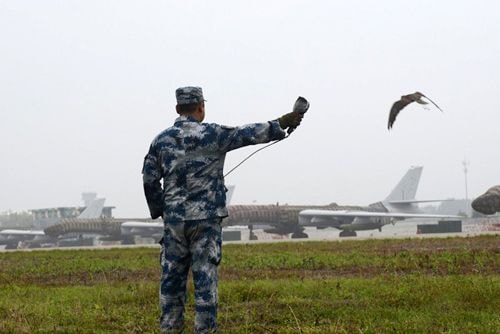China "increasing international outreach"?
(Baonghean) - Last week, all international attention seemed to be focused on the event on September 3rd when China celebrated the 70th anniversary of the end of World War II. At Tiananmen Square, General Secretary and President Xi Jinping announced that China would cut 300,000 troops. What does this have to do with the Chinese military participating in military exercises with Australia, Malaysia and the US in the Strait of Malacca in the near future?
Reduce troops to increase confidence
It was no coincidence that in front of 30 heads of state attending the parade, and 19 government representatives attending the parade to celebrate the 70th anniversary of the end of World War II, Xi Jinping announced a reduction of 300,000 troops. Although Xi did not clearly state the purpose of the reduction, it can be understood that this announcement "hits many targets with one arrow".
First of all, in the most “regular” sense, this is a normal action in the process of “modernizing” the Chinese military in the direction of streamlining: reducing quantity, increasing quality. In fact, this is the third time China has reduced its military size: the first time in 1980, the second time in 1997. This time, Mr. Xi Jinping announced a 13% reduction, in the total current military force of about 2.3 million troops, which means the equivalent of 300,000 troops. Domestically, in the context of declining economic growth, the Chinese stock market is in turmoil, such an announcement has more or less the meaning of “reassurance” because China’s defense budget estimate in 2015 reached 144 billion USD, an increase of 10.1% compared to 2014.
However, public opinion can understand that Mr. Tap's statement has more foreign significance. By announcing the reduction of troops, Mr. Tap wants to increase the trust of countries in this country after a series of Chinese activities that have caused concern to neighbors, countries in the region and the international community. The trust of the international community has seriously declined after China's actions of "actualizing" the illegal "cow tongue line" policy in the East Sea in a reckless manner. The act of illegally bringing the Haiyang 981 drilling rig into the waters under Vietnam's sovereignty, sovereign rights and jurisdiction, accelerating the renovation and construction of military bases on islands that China illegally occupied from Vietnam has been causing a simultaneous reaction from countries in the region and around the world.
Moreover, on May 26, 2015, when China issued the Defense White Paper “China Military Strategy”, the contents of this policy directly and indirectly created new tensions with tough statements such as: “We will not attack first unless attacked, and once attacked, we will respond”. Along with that, this policy also stated that China will strengthen 4 “important security areas”, including: ocean, outer space, cyberspace and nuclear force. The focus is on transforming the strategy of the Chinese Navy from “offshore defense” to a combination of “offshore defense” and “ocean protection” to deal with “threats to China’s maritime rights and interests”.
Therefore, by cutting the number of troops, China may want to strengthen the trust of the international community. That is what it wants, but whether it can achieve it or not is another matter.
 |
| Chinese soldiers practice flying falcons to ensure aviation safety. Photo: Internet |
Drills to approach
According to the plan, in the coming time, China will bring 1,160 soldiers and 2 warships, along with helicopters and transport planes to exercise with the US, Australia, and Malaysia in the Strait of Malacca. The content of the exercise is determined to focus on disaster relief, search and rescue, and ship hijacking scenarios. Not only that, a separate exercise between China and Australia will also be conducted from September 20-28 under the name "Panda Kanggaroo", with the content of training in survival skills, canoeing, and mountain climbing.
Why does China tend to conduct military exercises with such a civilian content? According to researchers, the Chinese military's recent "tough stance" in illegal disputed areas has made the international community "vigilant" towards the Chinese military, even considering it a threat to regional security. That will certainly cause disadvantages and obstacles for China, militarily, politically and economically.
Therefore, China needs to take measures to reduce suspicion and increasing participation in exercises with a “civilian” color is one of the measures to that end. Mr. Pang Zhongying - Dean of the School of Global Studies at Sun Yat-sen University - commented: “These joint exercises are part of Beijing’s efforts to bring its military closer to the international community.” That is considered a correct assessment.
In recent times, Chinese society has encountered many tumultuous problems. Chemical explosions causing human casualties have occurred in Tianjin and Shandong; the yuan has suddenly dropped sharply; the stock market has "free-falled"; investors and the rich in China are looking for ways to "change direction"... are really creating major changes. Not to mention the discovery and purging of "high-ranking" officials involved in corruption and "serious violations of Party discipline", which are having a significant impact on Chinese politics. Looking further, the Chinese economy, after a long period of "hot growth" and reaching the position of the world's second most powerful country, is now slowing down, declining and has no way to "regain its form", which is also a big problem. Therefore, at the important ceremony on September 3, China not only showed off its strength, but also wanted to consolidate its new image. To do so, China must strengthen its domestic and international confidence, improve and re-engage with relations on many fronts. In this roadmap, the announcement of troop reductions and the organization of military exercises with other countries can be considered the first steps.
Chi Linh Mountain


